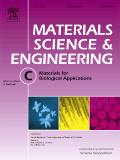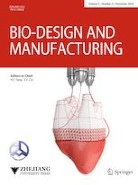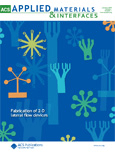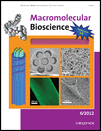
Advanced Healthcare Materials
Scope & Guideline
Bridging Science and Healthcare with Advanced Materials
Introduction
Aims and Scopes
- Biomaterials for Regenerative Medicine:
Research on biomaterials designed to promote tissue regeneration, including hydrogels, scaffolds, and 3D-printed constructs that mimic the extracellular matrix. - Nanotechnology in Healthcare:
Utilization of nanomaterials and nanoengineering techniques for drug delivery systems, imaging agents, and therapeutic applications, emphasizing targeted and controlled release. - Smart and Responsive Materials:
Development of materials that respond to environmental stimuli (e.g., pH, temperature, light) for applications in drug delivery, wound healing, and tissue engineering. - Microfluidics and Organ-on-a-Chip Systems:
Innovations in microfluidic technologies that allow for the creation of organ-on-a-chip models to study disease mechanisms, drug responses, and tissue interactions. - Immunomodulatory Materials:
Exploration of materials that can modulate immune responses, enhancing therapies for cancer, autoimmune diseases, and tissue regeneration.
Trending and Emerging
- Personalized Medicine and Advanced Therapies:
There is a growing emphasis on materials that enable personalized treatment approaches, including tailored drug delivery systems and patient-specific biomaterials. - Integration of AI and Machine Learning:
The incorporation of AI and machine learning techniques in the design and application of materials, particularly for diagnostics and predictive modeling, is increasingly prominent. - Sustainable and Biodegradable Materials:
Research is trending towards the development of eco-friendly and biodegradable materials, addressing environmental concerns while advancing healthcare applications. - Multifunctional Nanomaterials:
The design of multifunctional nanomaterials that can perform multiple tasks (e.g., imaging, therapy, diagnosis) is on the rise, showcasing the versatility and potential of nanotechnology. - Interdisciplinary Approaches:
Research that combines insights from biology, engineering, materials science, and medicine to create innovative solutions for complex healthcare problems is gaining momentum.
Declining or Waning
- Conventional Drug Delivery Systems:
Traditional drug delivery methods that do not incorporate advanced materials or nanotechnology have become less prominent, as the field shifts towards more innovative, targeted approaches. - Basic Biomaterial Studies:
Studies focused solely on the chemical or physical properties of biomaterials without direct applications in healthcare are being overshadowed by more applied research that emphasizes clinical relevance. - Tissue Engineering without Functionalization:
Research that does not explore the functionalization of tissue scaffolds for enhanced biological responses is becoming less frequent, as the focus is increasingly on creating biomimetic environments.
Similar Journals

MRS Advances
Unveiling Breakthroughs in Mechanical EngineeringMRS Advances, published by Springer Heidelberg, is an esteemed academic journal that serves as a vital platform for disseminating cutting-edge research in the fields of condensed matter physics, materials science, and mechanical engineering. With an ISSN of 2731-5894 and an E-ISSN of 2059-8521, the journal is hosted in Switzerland and encompasses an impressive spectrum of innovative studies that impact both theoretical and practical applications. Throughout its converged years from 2012 and continuing through 2024, MRS Advances has established itself with notable rankings, including Q4 in condensed matter physics and Q3 in several related categories. This journal not only enriches the academic community with its rigorous peer-reviewed articles, but also encourages open discussions that further advance research innovations. Although currently not designated as an open-access journal, its accessibility through institutional subscriptions ensures that professionals, researchers, and students can engage with the latest advancements in the material science arena. Emphasizing its relevance, MRS Advances is dedicated to fostering interdisciplinary collaboration and inspiring new discoveries within the global research community.

ADVANCED MATERIALS
Transforming Ideas into Advanced SolutionsAdvanced Materials, published by Wiley-VCH Verlag GmbH, is a premier academic journal that serves as a crucial platform for cutting-edge research in the field of materials science and engineering. With an impressive impact factor and ranking among the top tiers in various categories, including Materials Science, Mechanical Engineering, and Nanoscience, this journal is recognized for its high-quality contributions and relevance to contemporary research challenges. Spanning from 1989 to 2024, Advanced Materials not only features groundbreaking studies but also provides insights into innovative applications and advancements in material design and engineering. Researchers, professionals, and students alike will benefit from the rigorous peer-review process and diverse range of topics covered, making it an indispensable resource for those aiming to stay at the forefront of materials science innovation.

Materials Science & Engineering C-Materials for Biological Applications
Empowering discoveries in materials for biological innovation.Materials Science & Engineering C-Materials for Biological Applications is a premier journal published by ELSEVIER, dedicated to advancing the field of biomaterials through interdisciplinary research. With a robust ISSN of 0928-4931, this journal has made its mark in the realms of Chemical Engineering and Materials Science, achieving impressive Scopus rankings within its categories, namely Rank #16/151 in Bioengineering (89th percentile) and Rank #13/112 in Biomaterials (88th percentile). Although the journal's coverage in Scopus has been discontinued since 2021, it remains a critical resource for researchers, professionals, and students eager to explore innovative materials and their applications in biological contexts. The journal’s open access policy enhances its accessibility, fostering a global exchange of knowledge and inspiring future advancements in the field of materials science.

Bio-Design and Manufacturing
Exploring Cutting-Edge Research in Bio-DesignBio-Design and Manufacturing, published by SPRINGER HEIDELBERG, is a pioneering journal that stands at the forefront of innovation in the fields of Biomedical Engineering, Biotechnology, Industrial and Manufacturing Engineering, and Materials Science. With its ISSN 2096-5524 and E-ISSN 2522-8552, this journal has established itself as a leading platform for disseminating cutting-edge research and advancements that merge biological principles with manufacturing processes, emphasizing sustainable and efficient practices. It has garnered recognition in the 2023 category quartiles, boasting a Q1 rank in all its relevant fields, which underscores its significance and impact—evident from its prime Scopus rankings that place it within the top percentiles of numerous engineering and materials science disciplines. Researchers, professionals, and students alike benefit from the wealth of knowledge presented in this journal, making it an essential resource for those seeking to enhance their understanding of bio-design applications and innovation in manufacturing processes.

ADVANCED FUNCTIONAL MATERIALS
Connecting Researchers to the Future of Materials ScienceADVANCED FUNCTIONAL MATERIALS is a leading journal published by WILEY-V C H VERLAG GMBH, prominently recognized in the fields of biomaterials, chemistry, condensed matter physics, and materials science. With an impressive impact factor and a distinguished position in the Q1 quartile across multiple categories including nanoscience and nanotechnology, this journal serves as a vital platform for researchers and professionals committed to innovating in functional materials. Since its inception in 2000, ADVANCED FUNCTIONAL MATERIALS has published high-quality peer-reviewed articles that push the boundaries of materials science, exploring new frontiers in electronic, optical, and magnetic materials. The journal's dedication to open access ensures that its groundbreaking findings are readily available to a global audience, fostering collaboration and knowledge-sharing among scholars and practitioners in the field. For those seeking to stay at the forefront of materials research, ADVANCED FUNCTIONAL MATERIALS is an essential resource.

ACS Applied Materials & Interfaces
Elevating Knowledge in Materials Science and NanotechnologyACS Applied Materials & Interfaces, published by the American Chemical Society, stands as a leading journal in the field of applied materials, nanotechnology, and interdisciplinary research in medicine. With an impressive Impact Factor that places it in the Q1 category across Materials Science, Medicine, and Nanoscience and Nanotechnology, this journal consistently ranks among the top tier, evidencing its significance and influence in advancing scientific knowledge. The journal’s scopus ranking of 33 out of 463 in General Materials Science further underscores its critical role in disseminating innovative and high-quality research. Although it is not an open-access journal, a diverse range of access options is available, ensuring that vital research findings are accessible to a broad audience of researchers, professionals, and students. Targeting breakthroughs in the synthesis, characterization, and application of materials and interfaces, ACS Applied Materials & Interfaces serves as a pivotal platform for publishing cutting-edge studies essential for future technological advancements.

Advanced NanoBiomed Research
Bridging Disciplines for a Healthier TomorrowAdvanced NanoBiomed Research is a pioneering open-access journal committed to advancing the interdisciplinary field of nanobiotechnology, published by WILEY-V C H VERLAG GMBH. Since its inception in 2021, this journal has provided a platform for innovative research that bridges the gap between engineering, medicine, and materials science. With impressive rankings in Scopus, positioning it within the top quartiles of various categories, Advanced NanoBiomed Research aims to disseminate high-quality research that contributes to the understanding and application of nanomaterials in biomedical contexts. As it encompasses a wide scope—from applied microbiology to biomaterials—it serves as an essential resource for researchers, professionals, and students eager to explore the cutting-edge developments in the field. The journal promotes a collaborative environment where emerging ideas can flourish, ensuring that vital advancements in nanobiomedicine can be shared and built upon within the scientific community.

ChemNanoMat
Connecting Ideas in Nanoscale ApplicationsChemNanoMat is a prestigious academic journal published by WILEY-V C H VERLAG GMBH, dedicated to the rapidly evolving fields of nanoscale materials and their applications in diverse areas such as biomaterials, energy engineering, and environmental sustainability. With the journal's ISSN 2199-692X and recognized quality, as evidenced by its Q2 rankings across multiple categories—including Biomaterials and Renewable Energy—ChemNanoMat serves as a crucial platform for researchers, professionals, and students to disseminate their findings and foster collaborations. Operating from Germany, the journal encourages the exploration of innovative materials solutions to meet tomorrow's challenges. While it does not currently offer open access options, it remains highly regarded in the academic community with a competitive impact factor that emphasizes its relevance and influence in guiding future research directions. Covering a broad scope from 2015 through 2024, ChemNanoMat is key for anyone invested in the advancement of materials chemistry and related scientific fields.

ACS Materials Au
Showcasing the Best in Biomaterials and BeyondACS Materials Au, published by the American Chemical Society, is a premier open-access journal that has been at the forefront of materials science since its inception in 2021. With an ISSN of 2694-2461, this journal encompasses an expansive range of topics including biomaterials, electronic, optical and magnetic materials, materials chemistry, and polymers and plastics, consistently achieving Q1 rankings in these categories for 2023. The journal is based in the United States and operates from the AMS's headquarters in Washington, DC, offering significant visibility and a robust platform for researchers. The journal's commitment to open access ensures wide dissemination of groundbreaking research, enabling a diverse audience—including researchers, professionals, and students—to engage with the latest advancements in materials science. With an encouraging impact factor and a focus on novel materials and innovative applications, ACS Materials Au stands as a vital resource for anyone devoted to understanding and advancing the frontiers of materials engineering and science.

MACROMOLECULAR BIOSCIENCE
Pioneering Research at the Intersection of Biology and MaterialsMACROMOLECULAR BIOSCIENCE, published by WILEY-V C H VERLAG GMBH, is a leading journal in the fields of bioengineering, biomaterials, biotechnology, materials chemistry, and polymers and plastics. With a convergence of scientific inquiry since its inception in 2001, the journal has established itself as a vital resource for researchers and professionals exploring the interface of molecular sciences and biosystems. It boasts impressive Scopus rankings, including Q1 status in multiple categories, reflecting its significant contribution to advancing knowledge and innovation in the polymer and biomaterials domains. While the journal does not currently offer open access options, its rigorous peer-review process ensures the publication of high-quality research that fuels academic discourse. Positioned in Weinheim, Germany, MACROMOLECULAR BIOSCIENCE aims to bridge theoretical understanding with practical applications, making it an essential reference for students, academics, and industry practitioners dedicated to the evolving landscape of macromolecular bioscience.